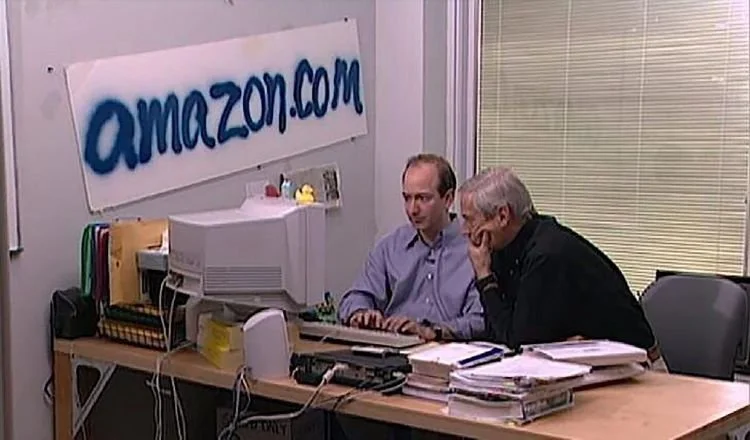From Abraham to Amazon: The Power of Leaving Your Comfort Zone
Jeff Bezos working from his garage in the early years of Amazon
In 1994, Jeff Bezos was just 30 years old and thriving as a senior vice president at D. E. Shaw, a prestigious Wall Street investment firm. He had what most people would consider a promising future: a secure, high-paying job, prestige, and a clear career path.
Then he encountered a statistic that changed everything: internet usage was growing at 2,300% per year. Bezos realized that this new medium could transform the world and that he could create something meaningful through it. He envisioned an online bookstore, a concept that didn't yet exist at scale.
He was at a crossroads: stay in comfort and security, or embrace uncertainty and risk. Years later, he recalled what guided his decision:
“When I'm 80 years old, I want to have minimized the number of regrets I have. I knew that if I failed, I wouldn't regret that. But I knew the one thing I might regret is not trying.”
He resigned, packed his car with his wife, drove from New York to Seattle, and wrote Amazon's first business plan on a laptop during the trip. Working out of a garage with makeshift desks, he traded comfort for uncertainty, sleepless nights, and long odds, all in pursuit of a bigger vision.
Today, Amazon is one of the world's most influential companies, and Bezos often reflects that real success comes not from avoiding failure, but from daring to leave comfort behind.
Stepping out of our comfort zone is one of the most important lessons for developing a business, organization, or even our identity. Growth and success cannot be taught in the classroom; they must be experienced firsthand, through trial and error. The rewards of such efforts are often unexpected and deeply meaningful.
In this week's Torah portion, Lech Lecha, we read of Abraham and Sarah, the first Jewish couple, and their journey of discovering G‑d and teaching monotheism to the world. The portion begins with G-d's command to Abraham:
“Go forth from your land, from your birthplace, and from your father's house, to the land that I will show you.” (Genesis 12:1)
The phrase Lech Lecha literally means “Go, to you.” At first glance, the words seem contradictory: Lech — go outward; Lecha — go inward. Yet they complement each other. By leaving comfort behind, we discover our truest selves.
Before this command, Abraham and Sarah had already inspired many to live moral lives and believe in one G‑d and had already experienced a significant level of success. Yet G‑d told them to leave their familiar surroundings.
As Rashi explains:
“Go forth for your benefit and your good… there I will make you into a great nation. Here, you will not merit to have children. Moreover, I will make your character known in the world.”
Abraham and Sarah could have rested on their accomplishments. But to fulfill their divine mission, to transcend human limitations, they needed to step out of their comfort zone and follow G-d's command. Only then did they merit family, wealth, and the birth of the Jewish nation.
The same principle applies to our spiritual lives. It is easy to fall into routine and feel comfortable with our level of Jewish observance, but true growth, inspiration, and meaning require stepping beyond comfort, even in small ways.
It might mean pausing in the middle of a busy workday to learn Torah in Ten and broaden our Jewish knowledge, inviting neighbors and friends to a Shabbat dinner, or putting up a mezuzah in our home or office. Each act of stepping out of our comfort zone empowers us to embrace our Jewish identity proudly and add more goodness and kindness in this world, and inspires our family and friends to explore and strengthen theirs as well.
G‑d's command to Abraham, “Go forth”, is also a call to all of us: leave the safety of self-contained living and engage with the world, transforming it into a G-dly place.
Especially now, when we are being challenged and even attacked for our Jewish beliefs and our connection to Israel — verbally, economically, and at times physically — it may feel easier or safer to stay quiet and hope the tension will pass. Yet history has shown us that retreat and silence have never been effective responses.
Now is the time to stand strong and proud, to display our Judaism openly and confidently. We must educate ourselves and be prepared to defend our brothers and sisters in Israel, both physically and spiritually. By stepping out of our comfort zone and expressing our Jewish identity with courage, we not only strengthen our own resolve but also inspire respect and solidarity from many good people who stand with us. In doing so, we counter the forces of darkness by bringing more light into the world.
As descendants of Abraham and Sarah, we too are called to be “a light unto the nations.” By studying Torah, performing mitzvot, and uplifting others, we both transform the world and refine ourselves.
Each of us carries the sacred privilege and responsibility to complete the mission Abraham and Sarah began over 3,500 years ago: to make this world a home for G‑d and to help usher in the final redemption.


